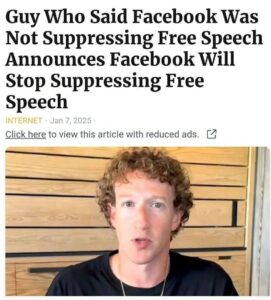Fact-Checkers Fired: The Internet’s Freedom Revolution is Here
The winds of change are howling through the digital sphere, and they’re shaking the foundations of the internet as we know it. Social media, long plagued by heavy-handed censorship and politically biased fact-checking, is undergoing a transformation. It’s not just a shift in strategy; it’s a cultural moment, a revolutionary awakening for truth and transparency. And the charge is being led by none other than Elon Musk and Mark Zuckerberg, two tech titans who are reshaping the rules of engagement in cyberspace.
For years, platforms like Facebook, Instagram, and Twitter operated under the shadow of aggressive moderation, where algorithms and fact-checkers held the power to decide what was true and what wasn’t. The result? A suffocating atmosphere where dissenting voices were silenced, memes were flagged, and debates were muzzled. But those days may finally be over. The fact-check mafia, as many have come to call them, has been unceremoniously shown the door.
Transparency and Community Over Control
Meta, formerly Facebook, made headlines with its announcement to dismantle its independent, nonpartisan fact-checking program. The company is replacing it with community notes, a user-driven feature akin to what Elon Musk has championed on X (formerly Twitter). This pivot represents a monumental shift from top-down control to bottom-up collaboration, allowing users to add context and nuance to posts without the stifling oversight of biased gatekeepers.
Zuckerberg himself admitted that Meta’s complex moderation system made too many mistakes, leading to over-censorship and eroded trust. It’s a rare moment of humility in Silicon Valley—an acknowledgment that the old system was broken and that transparency is the key to rebuilding credibility.
And let’s not forget Musk’s influence. Since taking the helm at X, he’s been relentless in his pursuit of an open internet. Musk’s reforms—from reinstating banned accounts to promoting transparency through the release of internal documents—have set a precedent that others are now scrambling to follow. His mantra is simple but powerful: Let the people decide.
The Death of Censorship
Meta’s changes go beyond fact-checking. The company is also loosening restrictions on contentious topics like immigration and gender. By moving its content moderation team from California to Texas, Meta is sending a clear signal: decentralization is the future. This isn’t just about geography; it’s about breaking free from the echo chambers that have long dominated tech culture.
The impact of these changes cannot be overstated. For the first time in years, users are experiencing what it feels like to speak freely without the looming threat of arbitrary censorship. Memes, once flagged as “fake news,” are thriving again. Voices that were silenced are now amplified. It’s as if the internet has woken up from a bad dream, and the air is electric with possibility.
The Clowns Are Gone, but the Circus Remains
Of course, this revolution isn’t without its skeptics. Critics argue that community-driven models like community notes could devolve into chaos, with users pushing their own agendas under the guise of context. But the alternative—a return to the stifling oversight of opaque fact-checking organizations—is no longer tenable. The clowns may be gone, but the circus isn’t leaving town. It’s just getting a new ringmaster.
This moment also highlights the growing divide between platforms that embrace freedom and those that cling to the old ways. As Meta and X blaze a trail for transparency, other platforms will face mounting pressure to follow suit or risk irrelevance. The tide has turned, and there’s no going back.
A Cultural Awakening
What we’re witnessing is more than a shift in corporate strategy; it’s a cultural awakening. The internet, once a bastion of free expression, had become a place where algorithms dictated reality and gatekeepers controlled the narrative. But now, the pendulum is swinging back. The chains of censorship are breaking, and digital freedom is rising like a phoenix from the ashes.
Musk and Zuckerberg, despite their differences, are united in this one crucial mission: to restore the internet’s original promise as a platform for open dialogue. They’re not just playing catch-up; they’re setting the pace for a new era of digital transparency and accountability.
The Road Ahead
The revolution is far from over. There will be challenges, missteps, and growing pains. But the momentum is undeniable. Fact-checkers have been fired, algorithms are flipping, and users are reclaiming their voices. It’s a messy, chaotic, and thrilling time to be online.
As we ride this wave of change, one thing is clear: the internet is once again becoming a place where ideas can flourish, debates can thrive, and the truth can rise to the surface. The fact-check mafia has been wrecked, and we, the users, are finally getting hired as the stewards of our own digital destiny.
So let’s embrace this moment. Let’s celebrate the death of censorship and the birth of a freer, more transparent internet. The winds of change are here, and they’re carrying us to brighter, bolder horizons.
Here is a song created by DJ Disruptarian;
